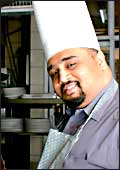|
It's 1 p.m. on a sunny winter afternoon
in Bangalore and code jocks from various multinational companies
are beginning to leave the confines of their air-conditioned cubicles
in search of lunch. Many of them stream into Mast Kalandar, an
Indian fast food restaurant on a dusty street off the arterial
Banerghatta Road in southern Bangalore, and grab a quick bite
before heading back to work. Inside, Pallavi Gupta, Director,
Spring Leaf Retail, the company that owns and manages four such
outlets around the city, has her hands full directing traffic
in the chaotic kitchen as orders begin to pile up. Ten minutes
from Gupta's outlet, just past the 100-acre campus of the Indian
Institute of Management, Jacob Peter, Country Manager, HayDirect,
Hay Group, a management consultancy, (he worked earlier with Microland
and Sun Microsystems), also has his hands full managing Dal Fryday,
a 62-cover full service north Indian and tandoori restaurant.
These could be scenes from any restaurant in India's Silicon
Valley, except that Gupta, Peter and several others of their ilk
are techies who, bitten by a (fast-spreading) entrepreneurial
bug, have metamorphosed into restaurateurs.
While these two prefer to focus on familiar cuisines, others
such as Roomali With A View (specialty Kashmiri, Rajasthani, Awadhi
and Punjabi) and Shiok (authentic far eastern) prefer to trod
the road less travelled. "We serve the best of the north
down south," declares Ashutosh Kapoor, Deputy gm (Brand and
Strategy), IBM India, who set up Roomali With A View three years
ago in partnership with his wife Deepali, who runs its day-to-day
affairs, while he focuses his energies on his day job.
| 
|
|
Tossing up a stir fry:
Shiok's Menon
|
Kapoor and Peter of Dal Fryday continue to hold on to their regular
careers, but others such as Mast Kalandar's Gupta (and husband
Gaurav Jain) and Madhu Menon of Shiok have chucked up promising
it careers to become full-time restaurateurs. "We always
knew that we wanted to do something on our own and this gave us
the chance to do it," says Gupta as she makes a brief appearance
from her bustling kitchen.
A five-minute drive from Kapoor's restaurant, Madhu Menon, md,
Shiok, is busy cooking up a far eastern storm for diners. Rather
than delegate cooking to his chefs, Menon, a self-confessed 'web
head', is enveloped in a mountain of steam as he tosses, cuts
and dices an avalanche of orders for his guests. Menon's love
affair with this kind of food started while he was studying in
Australia. "We had to stop over either at Singapore or Malaysia
on the way to Australia and I had my first brush with this cuisine
there," Menon tells us the next day over a late lunch. In
a market dominated by "Indian" Chinese restaurants that
serve the usual cornflour-laden soups and heavily-spiced chicken
and cauliflower Manchurians, Menon is trying to create a niche
for authentic Oriental cuisine.
| HURDLES ALL THE WAY |
»
Supply chain logistics are the biggest issue for
restaurateurs, since they have to manage everything, including
getting fresh vegetables
» Getting
and retaining quality people is a major problem as the industry
is growing by leaps and bounds and poaching is rampant
» Rentals
are sky-high in most prominent locations across Bangalore
and indeed across India; so, finding space is a huge problem
» Setting
up a restaurant involves procuring dozens of licences and
permits, which can be time-consuming and expensive
» Banks
are hesitant to fund this business unless you can show them
some collateral |
Abhik Biswas, who has worked with TCS, Verifone, ca and Cisco,
is another member of this tribe, and started Biryani Merchant
in September 2004. "We wanted a one-stop shop for a unique
biryani experience," says Biswas, who teamed up with his
close friend Vishy Shenoy (former marketing head of the Maharaja
Group in Sri Lanka) for this venture. For nearly a year prior
to its launch, Biswas and Shenoy spent days sampling an assortment
of authentic Lucknowi, Chettinad and other biryani in the bylanes
of Lucknow and Chennai to get the taste just right. "We would
try a couple of spoons of each, get a fix on its distinct taste
and then replicate it on a large scale in Bangalore," says
Biswas.
At Mast Kalandar, the aim is less lofty and more utilitarian.
Gupta and her techie husband Gaurav Jain are content catering
to the ever-burgeoning demand for clean, hygienic north Indian
food from the hundreds of it companies around its four units.
"We have used some retail expertise we picked up previously
(Wipro Technologies, TCS and Vensys, an Australian it company
where Jain worked closely with Pizza Hut) and have even put in
place a retail matrix to run our business," says Gupta. While
she manages the kitchen and back-end of the restaurant, her husband
looks after marketing and customer services. The matrix allows
them to keep tabs on each of their units and manage supply chain,
logistics and even unexpected demand for extra staff easily. Kapoor
even has a web-enabled system that allows him to log in remotely
to check on Roomali With A View's operations.
| 
|
|
Table's set, time to eat:
Biryani Merchant's Biswas
|
Given the crowd at these outlets (when we visited Mast Kalandar
at 1.10 p.m., we found the place packed; at Roomali With A View,
patrons, ranging from large families to groups of techies, crowd
the place in the evening), these code jocks have clearly got their
strategy spot on. However, all of them are quick to admit that
running a restaurant is a difficult business and that they are
only just coming to grips with it. Biswas of Biryani Merchant,
for instance, has tied up with Collabrant Incubators, a firm that
specialises in taking over and scaling high-potential businesses,
to try and ramp it up from just one restaurant and a handful of
kiosks to 300 restaurants nationwide. Under this arrangement,
Biswas will continue to be part of the management of this chain,
but the responsibility of scaling up the business now lies with
Collabrant Incubators, a Bangalore-based business strategy and
incubation services provider. "In the long term, our business
requires scale and some capital infusion to be successful,"
he argues, adding that he hopes to close around Rs 9-10 crore
in funding soon.
Elsewhere, Peter of Dal Fryday had more mundane issues-involving
money-to deal with when he decided to take a plunge into the restaurant
business. "I did not have the required collateral to qualify
for loans from most banks and financial institutions and my plans
were rejected several times. As an MBA working for multinationals,
you are used to travelling in luxury, staying at the finest hotels,
having an expense account and face no problems setting up meetings
with customers. The rejections made me realise that I had to succeed
on the basis of my wits and determination," says Peter. All
the techies in this report faced, and overcame, similar problems.
| A VC JUMPS IN |
| If code jocks
can run a restaurant successfully, there is clearly no reason
why venture capitalists can't. This may have been the train
of thought for Kiran Nadkarni, who set up East West Ethnic
Foods two years ago to get into the Indian fast food business.
Nadkarni, who funded a clutch of start-ups when he ran the
US office for VC firm JumpStartUp, has set up Kaati Zone just
off Bangalore's Mahatma Gandhi Road. Though he initially thought
of entering the ready-to-eat business, the growth of the retail
market convinced him to set up Kaati Zone as a test project.
"There are plenty of options for western fast food but
nothing for clean, Indian food; that's why I started Kaati
Zone," explains the 55-year-old Nadkarni. From his first
test store on M.G. Road, he started two more outlets on the
campuses of Infosys and HP and is now planning to expand that
presence across other IT campuses around the city. |
They had to climb other mountains as well. A restaurant requires
dozens of licences and permits to function and getting them can
be a nightmare. Bar licences, for instance, are no longer issued
in Bangalore and entrepreneurs have to buy these from places that
have closed, often paying up to Rs 30 lakh for each. Then, there
is the issue of setting up supply chains and ensuring that there
were no gaps in this, since even one missing link can cripple
the business. "There's no place in Bangalore where I can
get high-quality vegetables; so I have to get someone to go to
the local mandi and haggle with wholesalers there," says
Kapoor of Roomali With A View. For Menon, procuring fresh seafood
was a huge obstacle and he found himself sorting through a mountain
of seafood every morning to keep his restaurant in business. And,
like every other industry, finding and retaining quality people
is perhaps the biggest challenge these people face. "Keeping
our staff is a huge challenge in the rapidly evolving industry,
where everyone's on the hunt for talent. We have to treat them
as family and keep them involved with the evolution of Mast Kalandar,"
says Gupta.
| 
|
|
Naan, anyone? Roomali
With A View's Kapoor
|
Despite these odds, these techies-turned-restaurateurs have ambitious
expansion plans lined up. Perhaps the most ambitious is Biswas'
plan for Biryani Merchant. He envisages having 300 outlets of
all sizes-from small take-out kiosks to full-scale sit-down restaurants-over
the next three years. Gupta and Jain of Mast Kalandar, meanwhile,
plan to follow the IT industry to Tier-II towns such as Hyderabad
and Pune, and Kapoor is planning to extend his reach within Bangalore.
Interestingly, Peter of Dal Fryday is looking beyond the restaurant
business and plans to foray into the resorts business in the long
term. "We are just at the tip of the iceberg and the journey
ahead promises to be a challenging, yet rewarding, one,"
says Jain.
And, that's clearly food for thought.
|








